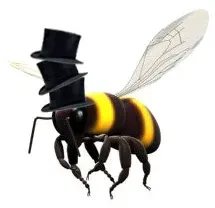Hats off to the bees
Written by

By Philip Patston
Usually I wear a lot of hats, all at once. Luckily they are metaphorical, otherwise I'd look a bit odd. But it takes a bit of doing and I often need to change the order in which they are piled on my head mid-way through an event.
It's an art in itself really, changing hats in a fluid, discreet way: part modelling, part juggling, part brain gym. Vaguely discombobulating but strangely gratifying. Try it.
So there I was, gratefully discombobulated on 7 April when I was lucky enough be invited by the NZ Centre for Social Innovation to hear Geoff Mulgan of the Young Foundation speak on Innovating through Recession. I was there with the following hats, precariously balanced as always: social entrepreneur, creative entrepreneur, comedian, consultant, blogger, guy in wheelchair looking like he's balancing something on his head.
Mulgan is the Young Foundation's Director and a prolific social entrepreneur. He's advised governments, founded think tanks, consulted, lectured and is currently a Thinker in Residence for the Government of South Australia. Now there's a job. As he spoke, I cycled through my many hats, listening for answers to questions like, what's funny in all of this, what can I share with clients, what can I write about and, foremost, what is the role of creatives in social change?
The latter question was answered early in his address as Mulgan discussed his theory on the six phases of social innovation, which are:
• Diagnosis, prompts
• Ideas, proposals, design
• Trials, prototyping, pilots
• Spreading, scaling and diffusion, growing
• Embedding, sustaining, business models
• Systemic change and transformation
Mulgan was quick to acknowledge the role of creativity and art in the second stage of innovation. This observation reminded me of a point I made about social and creative entrepreneurs in Idealog back in August 2008, when I reflected on being part of both the NZ Social Entrepreneur Fellowship and ART's ArtVenture programme:
"As different as the groups seem on the surface, at times almost contradicting each other in terms of entrepreneurial principles, deep down there have been revealing similarities between the two. I was relieved to observe the deep commitment to social change I found in my fellow creatives (my biggest fear was to be stuck with a bunch of arty-farty poseurs); likewise I have been suitably impressed by the creativity of my social fellows. This overlap has been one of the perks of straddling both worlds."
He also used an interesting metaphor for the interaction between creative ideas-people and companies and individuals with abundant resources and power, likening the former to bees, the latter to trees and pointing out the need for more intermediaries to help them work better together. My thoughts moved to how such intermediation might foster higher levels of trust between bees and trees in order to invest more creative and financial risk in social change.
Mulgan believes recession makes governments more radical and open to innovation. I wonder if the NZ Government is following his rule and whether politicians see themselves as intermediaries.
Take no as a question not an answer was Mulgan's final piece of sage advice. Do you understand? No? Exactly. If it takes ten no's to get a yes, as my business learning taught me, then it must take ten questions to get the right answer. Damn, sounds like more research to me.
Speaking of questions, as I lead into (and shamelessly promote) my new show, Philip Patston Gives You A Bit of What He's Got at the New Zealand International Comedy Festival starting 2 May, I am asking myself, can I successfully wear all my hats on stage and get a laugh at the same time?
No? Come and watch me give it a bit of what I've got.
In the meantime, I'd like to know what you think. Do bees and trees need more trust in order to improve creative solutions for social change? If so, who could help foster that - Government or someone else? Leave a comment...